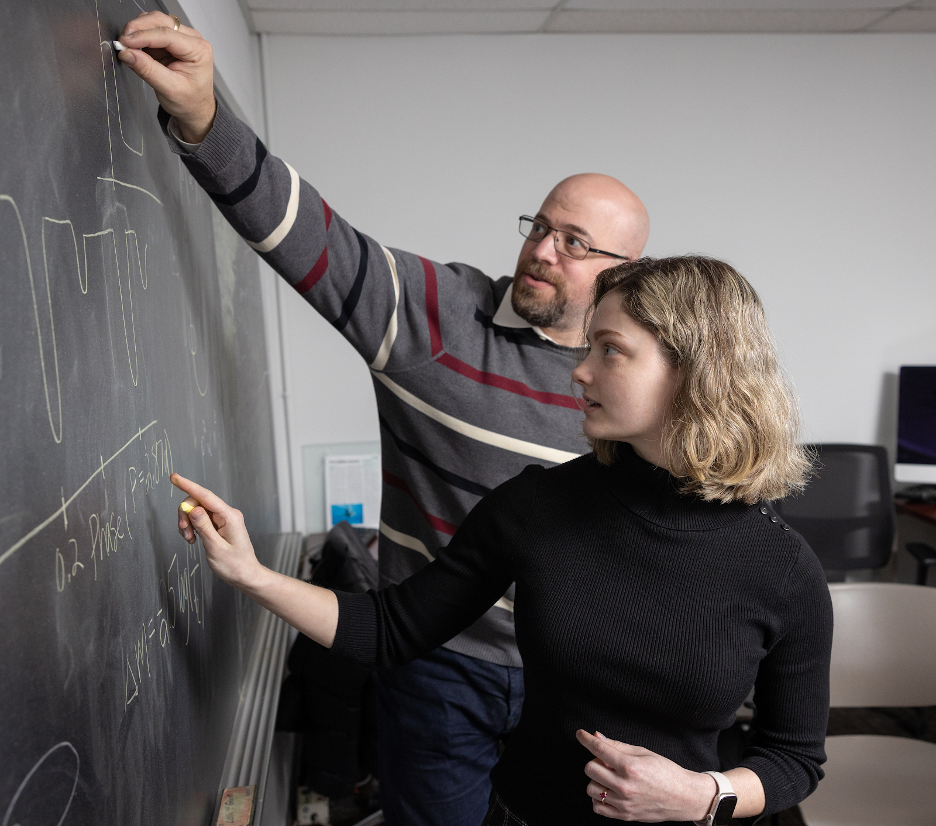Program Requirements
B.S. in Astrophysics
Mathematics Courses (18-19)
- MATH 021 Calculus I (4)
- MATH 022 Calculus II (4)
- MATH 023 Calculus III (4)
- MATH 205 Linear Methods (3)
Select one of the following:
- MATH 208 Complex Variables (3)
- MATH 320 Ordinary Differential Equations (3-4)
- MATH 322 Methods of Applied Analysis I (3)
Basic Science Courses (20)
- PHY 021 Introductory Physics II (4)
- PHY 012 Introductory Physics Laboratory I (1)
- PHY 022 Introductory Physics Laboratory II (1)
- PHY 031 Introduction to Quantum Mechanics (3)
- CHM 030 Introduction to Chemical Principles (4)
- ASTR 105 Planetary Astronomy (3)
Select one of the following:
- PHY 011 Introductory Physics I (4)
- PHY 010 General Physics I (4)
Laboratory and Computing Courses (7)
- PHY 220 Advanced Physics Laboratory I (3)
- PHY 221 Advanced Physics Laboratory II (2)
Select one of the following:
- CSE 003 Fundamentals of Programming (2)
- CSE 007 Introduction to Programming (2)
*Or an equivalent course in scientific computing
Intermediate and Advanced Courses (22)
- PHY 212 Electricity and Magnetism I (3)
- PHY 213 Electricity and Magnetism II (3)
- PHY 215 Classical Mechanics I (4)
- PHY 340 Thermal Physics (3)
- PHY 362 Atomic and Molecular Structure (3)
- ASTR 301 Introduction to Stellar Astrophysics (3)
- ASTR 302 Introduction to Galactic and Extragalactic Astrophysics (3)
Elective Courses (15)
Select five Physics or Astronomy courses numbered higher than 100. Up to two courses in appropriate technical areas offered in other departments may be substituted, when selected with advisor approval. Students planning graduate work in physics are encouraged to include PHY 273 (Research) among their electives.
Total Credits 82-83
A total of 123 credit hours are required for the B.S. in Astrophysics.
B.A. in Astronomy
Mathematics Courses (15)
- MATH 021 Calculus I (4)
- MATH 022 Calculus II (4)
- MATH 023 Calculus III (4)
- MATH 205 Linear Methods (3)
Basic and Intermediate-Level Science (25-26)
- ASTR 007 Introduction to Astronomy (3)
- ASTR 008 Introduction to Astronomy Lab (1)
- EES 021 Introduction to Planet Earth (3)
- PHY 012 Introductory Physics Laboratory I (1)
- PHY 022 Introductory Physics Laboratory II (1)
- PHY 031 Introduction to Quantum Mechanics (3)
- ASTR 105 Introduction to Planetary Astronomy (3)
- PHY 220 Advanced Physics Laboratory I (3)
Select one of the following:
- PHY 010 General Physics I (4)
- PHY 011 Introductory Physics I (4)
Select one of the following:
- PHY 013 General Physics II (3)
- PHY 021 Introductory Physics II (4)
Advanced Astronomy and Astrophysics (6)
- ASTR 301 Introduction to Stellar Astrophysics (3)
- ASTR 302 Introduction to Galactic and Extragalactic Astrophysics (3)
Approved Electives (6)
Select two additional courses from the following:
- ASTR 332 High-Energy Astrophysics
- ASTR 342 General Relativity
- PHY 212 Electricity and Magnetism I
- PHY 213 Electricity and Magnetism II
- PHY 215 Classical Mechanics I
- PHY 340 Thermal Physics
- PHY 362 Quantum Mechanics I
- PHY 364 Nuclear and Elementary Particle Physics
- PHY 366 Introduction to String Theory
Total Credits 52-53
A total of 120 credit hours are required for the Bachelor of Arts in Astronomy.
Minor in Astronomy
The minor in astronomy consists of 15 credits of astronomy and physics courses, at least 6 credits of which must be astronomy courses at or above the 100-level. No more than one course required in a student’s major program may be included in the minor program. The minor program should be designed along a coherent intellectual theme in consultation with the Physics Department Chair. Examples of course sequences for the minor program can be found on the Physics Department Web Site.
Departmental Honors in Astronomy or Astrophysics
Students receiving a BA in Astronomy or a BS in Astrophysics may earn Departmental Honors by satisfying the following requirements:
- Academic Performance: Minimum grade point average of 3.50 in astronomy and physics courses used to satisfy the major degree requirements.
- Research or Project-Based/Creative Activity: completion of approved1 special topics courses in astronomy that include written reports, or completion of 6 credits of ASTR 273 (research) or equivalent, or completion of a summer research project with written report and oral presentation
- Additional Course Work: Completion of at least one approved1 300-level course in either physics or astronomy beyond those required in the student’s degree program. This course may not be selected from special topics or research courses such as ASTR 372.
*specific approvals are granted by the Program Director

